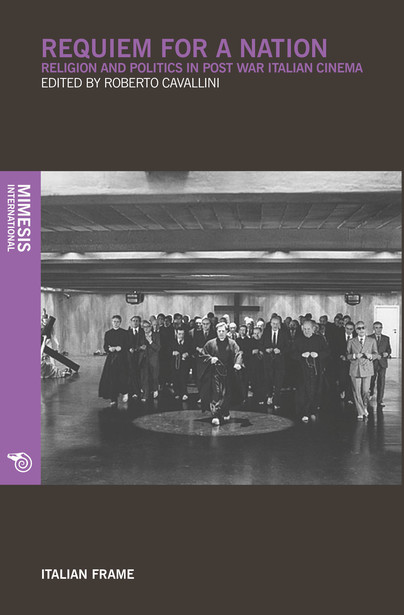
Format: Paperback
Pages: 156
ISBN: 9788869770562
Pub Date: 30 Nov 2016
Illustrations: 5 illustrations
Description:
The main objective of this edited collection is to examine the ways in which religion, culture and politics converge in configuring the contradictions of a post-war Italy’s cultural history. Starting from the assumption that to conduct a critical reflection on Italian post-war visual culture one must investigate the inevitable impact of Catholic religion on everyday life and its social, political and cultural dimensions, the volume employs the vantage point of cinema to propose a critique and exploration of religion’s influence on the Italian cultural landscape. The edited anthology thus seeks to examine how religion is lived, performed, criticized and represented from various methodological perspectives (historical, philological, aesthetic, psychoanalytical, popular studies etc), through four main sections: ‘Propaganda and Censorship’, ‘Auteurial Voices’, ‘Religion in Popular Italian Cinema’, ‘Modern rituals, Ancient myths’.
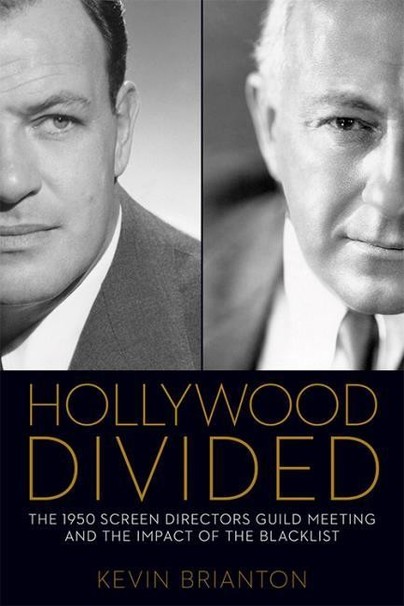
Format: Hardback
Pages: 174
ISBN: 9780813168920
Pub Date: 15 Nov 2016
Series: Screen Classics
Illustrations: 13 b/w photos
Description:
On October 22, 1950, the Screen Directors Guild (SDG) gathered for a meeting at the opulent Beverly Hills Hotel. Among the group's leaders were some of the most powerful men in Hollywood -- John Ford, Cecil B. DeMille, Joseph L.
Mankiewicz, John Huston, Frank Capra, William Wyler, and Rouben Mamoulian -- and the issue on the table was nothing less than a vote to dismiss Mankiewicz as the guild's president after he opposed an anticommunist loyalty oath that could have expanded the blacklist. The dramatic events of that evening have become mythic, and the legend has overshadowed the more complex realities of this crucial moment in Hollywood history.In Hollywood Divided, Kevin Brianton explores the myths associated with the famous meeting and the real events that they often obscure. He analyzes the lead-up to that fateful summit, examining the pressure exerted by the House Un-American Activities Committee. Brianton reveals the internal politics of the SDG, its initial hostile response to the HUAC investigations, the conservative reprisal, and the influence of the oath on the guild and the film industry as a whole. Hollywood Divided also assesses the impact of the historical coverage of the meeting on the reputation of the three key players in the drama.Brianton's study is a provocative and revealing revisionist history of the SDG's 1950 meeting and its lasting repercussions on the film industry as well as the careers of those who participated. Hollywood Divided illuminates how both the press's and the public's penchant for the "exciting story" have perpetuated fabrications and inaccurate representations of a turning point for the film industry.
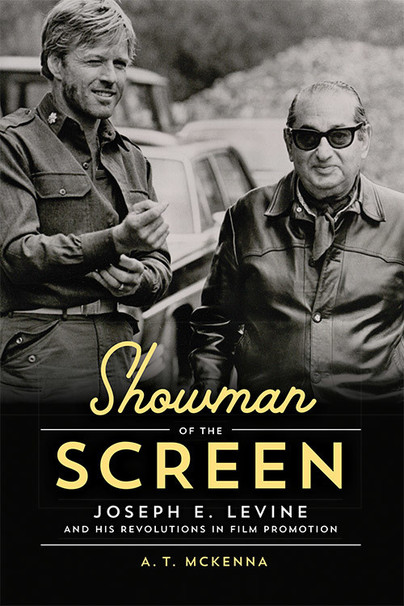
Format: Hardback
Pages: 296
ISBN: 9780813168715
Pub Date: 01 Nov 2016
Series: Screen Classics
Illustrations: 30 b/w images
Description:
Short, immaculately dressed, and shockingly foul-mouthed, Joseph E. Levine (1905--1987) was larger than life. He rose from poverty in Boston's West End to become one of postwar Hollywood's most prolific independent promoters, distributors, and producers.
Alternately respected and reviled, this master of movie promotion was responsible for bringing films as varied as Godzilla: King of the Monsters! (1956), Hercules (1958), The Graduate (1967), The Lion in Winter (1968), and A Bridge Too Far (1977) to American audiences .In the first biography of this controversial pioneer, A. T. McKenna traces Levine's rise as an influential packager of popular culture. He explores the mogul's pivotal role in many significant industry innovations from the 1950s to the 1970s, examining his use of saturation release tactics and bombastic advertising campaigns. Levine was also a trailblazer in promoting European art house cinema in the 1960s. He made Federico Fellini's 8½ (1963) a hit in America, feuded with Jean-Luc Godard over their production of Contempt (1963), and campaigned aggressively for Sophia Loren to become the first actress to win an Oscar for a foreign language performance for her role in Two Women (1960).Despite his significant accomplishments and prominent role in shaping film distribution and promotion in the post-studio era, Levine is largely overlooked today. McKenna's in-depth biography corrects misunderstandings and misinformation about this colorful figure, and offers a sober assessment of his contributions to world cinema. It also illuminates Levine's peculiar talent for movie- and self-promotion, as well as his extraordinary career in the motion picture business.

Format: Paperback
Pages: 150
ISBN: 9788869770548
Pub Date: 06 Oct 2016
Illustrations: 10 illustrations
Description:
For a long time, comparisons of cinema and photography have been predominantly a question of contrast, both of their forms and their ways of seeing. This special issue of Cinéma & Cie reverses the perspective, by addressing some of the fundamental spaces of convergence and coexistence betweenthe two languages. While they have always been somewhat present in the history of thetwo arts (not only in chronophotography, but also astronomic photography, photographic series, and still photography), the photocinematic forms have become particularly relevant in the archaeology of post-media culture that has characterised much scholarship lately.
What tools should we employ to study these confluences today? Is it possible to perceive overlapping images also in strictly cinematic or photographic works? From this perspective, the special issue deals with borderline authors, such as Jeff Wall; post-filmic aesthetics, such as the cinematic tableau vivant and innovative examples of contemporary, experimental audiovisual production.
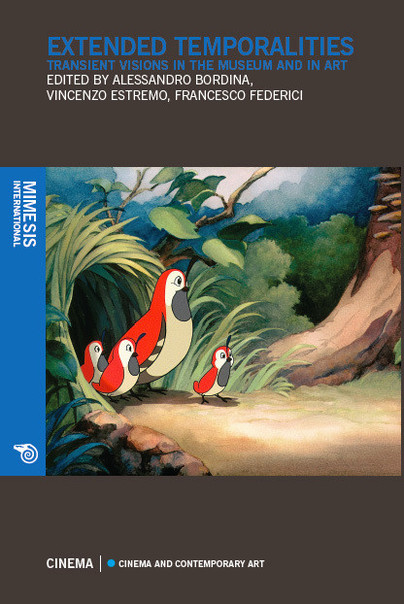
Format: Paperback
Pages: 160
ISBN: 9788869770517
Pub Date: 08 Sep 2016
Illustrations: 30 b/n illustrations
Description:
This book has been conceived from a series of speeches which took place during the Filmforum Festival of Udine and Gorizia whose main theme was the use of moving images in the space of contemporary art. The aim of this publication is to create a scientific framework of some of the most important artistic experiences: from the use of archive images to the newest participatory practices. The book consists of essays selected during the Filmforum Festival and the MAGIS International Film Studies Spring School and texts from invited researchers.
It examines the ways in which the transient qualities of time have been used in contemporary moving images production and in their display.
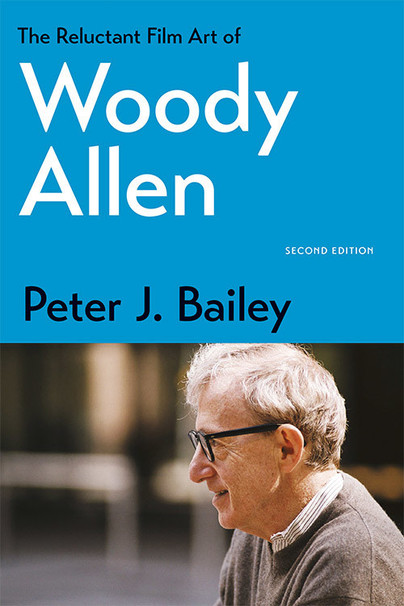
Format: Paperback
Pages: 426
ISBN: 9780813167190
Pub Date: 27 May 2016
Illustrations: 59 b/w photos placed throughout
Description:
For five decades, no American filmmaker has been as prolific -- or as paradoxical -- as Woody Allen. From Play It Again, Sam (1972) to Midnight in Paris (2011) and Blue Jasmine (2013), Allen has produced an average of one film a year; yet in many of these movies Allen reveals a progressively skeptical attitude toward both the value of art and the cultural contributions of artists.In this second edition Peter J.
Bailey extends his classic study to consider Allen's work during the twenty-first century. He illuminates how the director's decision to leave New York to shoot in European cities such as London, Paris, Rome, and Barcelona has affected his craft. He also explores Allen's shift toward younger actors and interprets the evolving critical reaction to his films -- authoritatively demonstrating why the director's lifelong project of moviemaking remains endlessly deserving of careful attention.
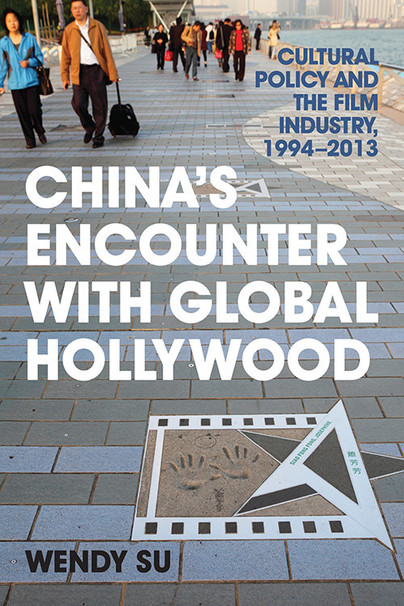
Format: Hardback
Pages: 240
ISBN: 9780813167060
Pub Date: 13 May 2016
Series: Asia in the New Millennium
Illustrations: 3 figures, 6 tables
Description:
In recent years, the film industry in the People's Republic of China has found itself among the top three most prolific in the world. When the Chinese government introduced a new revenue-sharing system in 1994, the nation's total movie output skyrocketed with gross box-office receipts totaling billions of yuan. This newfound success, however, has been built on an alternately competitive and collaborative relationship between the ascendant global power of China and the popular culture juggernaut of America.
In China's Encounter with Global Hollywood, Wendy Su examines the intertwining relationships among the Chinese state, global Hollywood, and the Chinese film industry while analyzing the causes and consequences of the rapid growth of the nation's domestic film production. She demonstrates how the Chinese state has consolidated power by negotiating foreign interest in the lucrative Chinese market while advancing its cultural industries. Su also reveals how mainland Chinese and Hong Kong filmmakers have navigated the often-incompatible requirements of marketization and state censorship.This timely analysis demonstrates how China has cannily used global capital to modernize its own film industry and now stands poised to step clear of Hollywood's shadow. The country's debates -- on- and offscreen -- over cultural change, market-based economic reforms, and artistic freedom illuminate China's ongoing efforts to build a modern national identity.
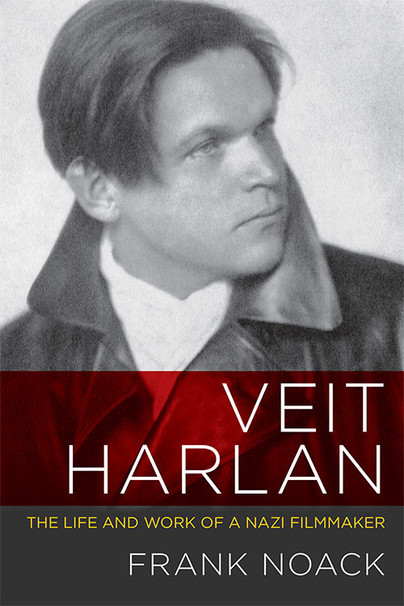
Format: Hardback
Pages: 496
ISBN: 9780813167008
Pub Date: 08 Apr 2016
Series: Screen Classics
Illustrations: 50 b&w photos
Description:
Veit Harlan (1899--1964) was one of Germany's most controversial and loathed directors. After studying with theatre and film pioneer Max Reinhardt and beginning a promising career, he became one of Joseph Goebbels's leading filmmakers under the National Socialist regime. Harlan's Jud Süss ( Jew Suss, 1940), in particular, stands as one of the most artistically distinct and morally reprehensible films produced by the Third Reich.
His involvement with this movie has led to many critical questions: Was the director truly forced to make the film under penalty of death? Is anti-Semitism a theme in his other productions? Can and should his work be studied in light of the horrors of Nazism and the Holocaust?The first English-language biography of the notorious director, Veit Harlan presents an in-depth portrait of the man who is arguably the only Nazi filmmaker with a distinct authorial style and body of work. Author Frank Noack reveals that both Harlan's life and work were marked by creative vision, startling ambiguities, and deep moral flaws. His meticulously detailed study explores the director's influence on German cinema and places his work within the contexts of World War II and film history as a whole.Rivaled only by Leni Riefenstahl, Veit Harlan remains one of Germany's most infamous filmmakers, and virtually every book on Nazi cinema contains at least one chapter about Harlan or an analysis of one of his movies. This biography -- supplemented by production histories and rare interviews with actors, actresses, and cameramen -- offers the first comprehensive analysis of the director and his work and adds new perspective to the growing body of scholarship on filmmaking under the Third Reich.
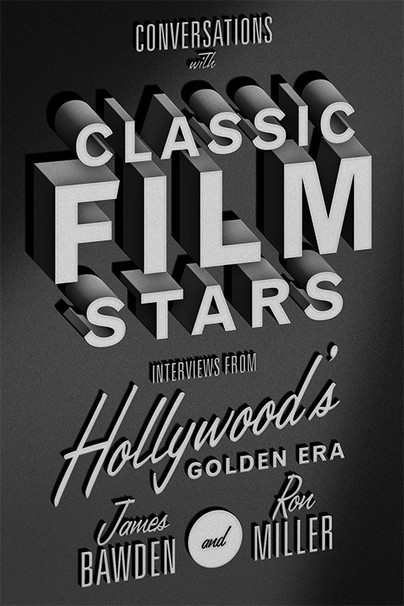
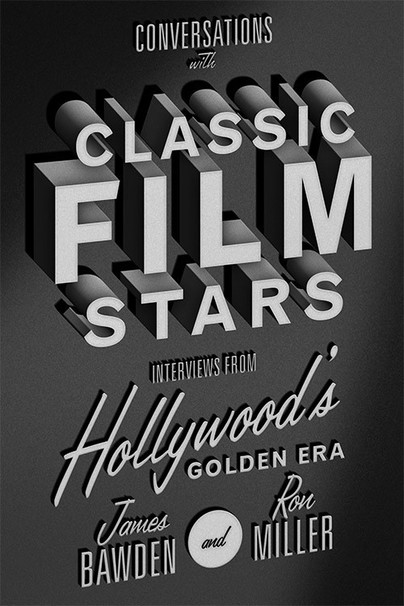
Pages: 440
ISBN: 9780813167107
Pub Date: 01 Apr 2016
Series: Screen Classics
Illustrations: 100 b&w photos
Pages: 440
ISBN: 9780813174389
Pub Date: 20 Oct 2017
Series: Screen Classics
Illustrations: 100 b&w photos
Description:
James Bawden: Seeing the way people behave when they're around you, is it still fun being Cary Grant?Cary Grant: I don't like to disappoint people. Because he's a completely made-up character and I'm playing a part.
It's a part I've been playing a long time, but no way am I really Cary Grant. A friend told me once, "I always wanted to be Cary Grant." And I said, "So did I." -- from the bookIn Conversations with Classic Film Stars, retired journalists James Bawden and Ron Miller present an astonishing collection of rare interviews with the greatest celebrities of Hollywood's golden age. Conducted over the course of more than fifty years, they recount intimate conversations with some of the most famous leading men and women of the era, including Douglas Fairbanks Jr., Joseph Cotten, Cary Grant, Gloria Swanson, Joan Fontaine, Loretta Young, Kirk Douglas, and many more.Each interview takes readers behind the scenes with some of cinema's most iconic stars. The actors convey unforgettable stories, from Maureen O'Hara discussing Charles Laughton's request that she change her last name, to Bob Hope candidly commenting on the presidential honors bestowed upon him. Humorous, enlightening, and poignant, Conversations with Classic Film Stars is essential reading for anyone who loves classic movies.

Format: Paperback
Pages: 140
ISBN: 9788869770241
Pub Date: 31 Mar 2016
Description:
As the institutionalization of the avant-garde took place, postmoderntheory both reacted to and helped create the forces that erodedreason and even taste, labelled them quaint in the name of apostmodern theory, at the same time that mass commodity form wasinscribing exchange value on all work of the imagination. In fact, thereality is that the system, the society of domination has enclosed discoursein such a way that, coupled to new social media and electronicplatforms, all radical, all working class or under class voices are prevetted or erased, and only the most craven corporate financializedkitsch is validated. The collusion of galleries, collectors and curators,following the model of studio film and network TV, has equated popularitywith quality.
The problem then is to recuperate something of thelost radical conscience of art and culture. There is now an amnesiaabout the prehistory of society, of our own psyches, and of the imagination.The colonizing of consciousness has rendered the imaginationof the west atrophied and almost inert. All art is a recreationof our own psychic formation (mimesis) as well as being shaped byits ‘otherness’, by a purposelessness. All stories are crime stories,all stories are about exile, and all stories are about homesickness.And all art contains a narrative. For only by having no purpose canthe artwork posit the direction to which society must look to createan ‘other’ or elsewhere. To retain something of that utopian promisethat is foundational in culture. The world is being dis-enchanted. TheUtopian promise is not kept.
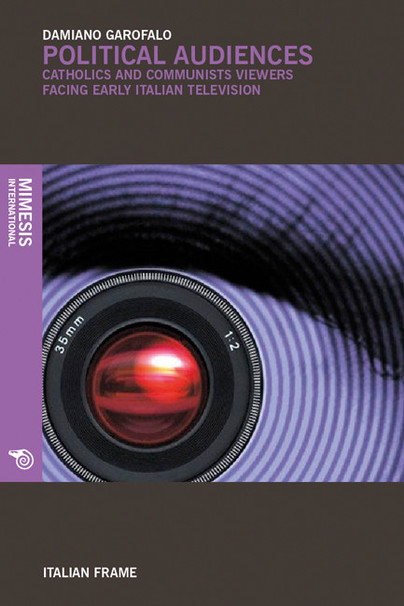
Format: Paperback
Pages: 96
ISBN: 9788869770142
Pub Date: 22 Feb 2016
Description:
This book, which is an excerpt of the author’s Ph.D. dissertation, deals with the popular reception of early Italian television, during the years of the so-called “lungo miracolo” (1954-1969).
To do so, the author focuses on the Catholic and Communist audiences’ perception of the first TV programs. The investigation into these two main groups’ reception is conducted through analysis of all TV references, tracked in the reader’s columns of the two most popular magazines of those years: the Catholic “Famiglia Cristiana” and the Communist “Vie Nuove”. The text ise introduced by a preface written by professor Stephen Gundle, one of the major experts on the circulation and reception of mass culture in modern Italy.
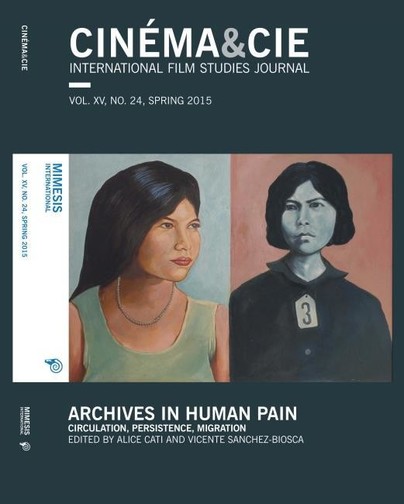
Format: Paperback
Pages: 174
ISBN: 9788869770463
Pub Date: 22 Jan 2016
Illustrations: 10 illustrations
Description:
The images of atrocity, either analog or digital, are always the trace of an encounter between the gaze of a photographer or a cameraman and a human being suffering from the painful effects of man-made violence. The archive images resulting from such an encounter raise some inevitable questions: who took them and for what purpose? Is it possible to retrace the process that led to these shots?
What do they hide behind what the eye can see? This special issue of Cinéma & Cie will not only focus on the production of such images, but also on their persistence on the synchronic level (in the media: newspapers, magazines, cinema, television, the Internet, museums…) as well as on the diachronic level (across time: mutation, re-editing, inversion…). From propaganda to counter-propaganda, from purposes of memory to artistic aims, the circulation of these images proves that repetition always implies difference.
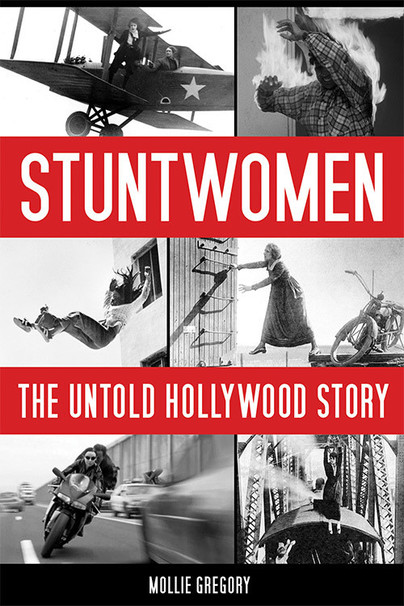
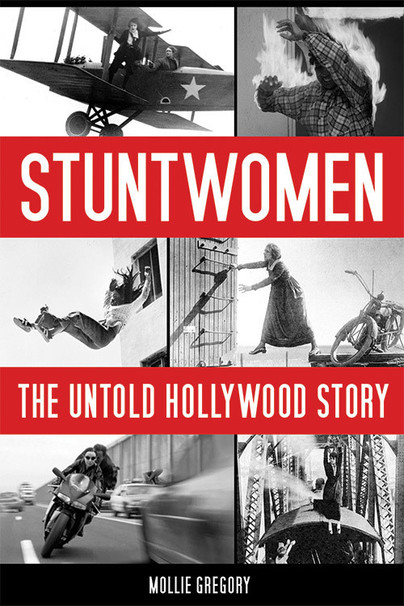
Pages: 360
ISBN: 9780813166223
Pub Date: 19 Nov 2015
Series: Screen Classics
Illustrations: 73 b&w photos
Pages: 360
ISBN: 9780813175836
Pub Date: 03 Aug 2018
Series: Screen Classics
Illustrations: 73 b&w photos
Description:
They've traded punches in knockdown brawls, crashed biplanes through barns, and raced to the rescue in fast cars. They add suspense and drama to the story, portraying the swimmer stalked by the menacing shark, the heroine dangling twenty feet below a soaring hot air balloon, or the woman leaping nine feet over a wall to escape a dog attack. Only an expert can make such feats of daring look easy, and stuntwomen with the skills to perform -- and survive -- great moments of action in movies have been hitting their mark in Hollywood since the beginning of film.
Here, Mollie Gregory presents the first history of stuntwomen in the film industry from the silent era to the twenty-first century. In the early years of motion pictures, women were highly involved in all aspects of film production, but they were marginalized as movies became popular, and more important, profitable. Capable stuntwomen were replaced by men in wigs, and very few worked between the 1930s and 1960s. As late as the 1990s, men wore wigs and women's clothes to double as actresses, and were even "painted down" for some performances, while men and women of color were regularly denied stunt work.For decades, stuntwomen have faced institutional discrimination, unequal pay, and sexual harassment even as they jumped from speeding trains and raced horse-drawn carriages away from burning buildings. Featuring sixty-five interviews, Stuntwomen showcases the absorbing stories and uncommon courage of women who make their living planning and performing action-packed sequences that keep viewers' hearts racing.
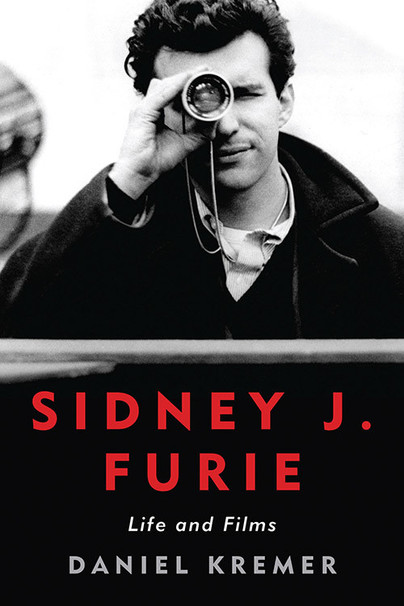
Format: Hardback
Pages: 430
ISBN: 9780813165967
Pub Date: 12 Nov 2015
Series: Screen Classics
Illustrations: 77 b&w photos
Description:
Known for his visual style as well as for his experimentation in virtually every genre of narrative cinema, award-winning director Sidney J. Furie also has the distinction of having made Canada's first ever feature-length fictional film in English, A Dangerous Age (1957). With a body of work that includes The Ipcress File (1965), Lady Sings the Blues (1972), and The Entity (1982), he has collaborated with major stars such as Marlon Brando, Frank Sinatra, Robert Redford, and Michael Caine, and his films have inspired some of Hollywood's most celebrated directors, including Stanley Kubrick and Quentin Tarantino.
In this first biography of the prolific filmmaker, author Daniel Kremer offers a comprehensive look at the director's unique career. Furie pioneered techniques such as improvisation in large-scale film productions, and sometimes shot his films in sequence to develop the characters from the ground up and improve the performers' in-the-moment spontaneity. Not only has Stanley Kubrick acknowledged that Furie's The Boys in Company C (1978) informed and influenced Full Metal Jacket (1987), but Martin Scorsese has said that he considers The Entity to be one of the scariest horror films of all time. However, Furie was often later criticized for accepting lowbrow work, and as a result, little serious study has been devoted to the director.Meticulously researched and enhanced by Kremer's close relationship with the filmmaker, this definitive biography captures the highs and lows of an exceptional but underexamined career, taking readers behind the scenes with a director who was often ahead of his time.

Format: Paperback
Pages: 214
ISBN: 9788869770227
Pub Date: 31 Oct 2015
Description:
Over the last two decades, discoveries made in the field of cognitive neuroscience have begun to permeate humanities and social sciences. This special issue of Cinéma & Cie focuses on major conceptual and epistemological arguments arising from the dialogue between audiovisual studies and neurosciences. In the context of this intersection, Neurofilmology is an interdisciplinary research program that arises at the encounter between two models of viewer: the viewer-as-mind (deriving from a cognitive/ analytical approach) and the viewer-as-body (typical of the phenomenological/continental approach).
Accordingly, Neurofilmology focuses on the viewer-as-organism, by investigating with both empirical and speculative epistemological tools the subject of audiovisual experience, postulated as embodied, embedded, enacted, extended, emerging, affective, and relational.
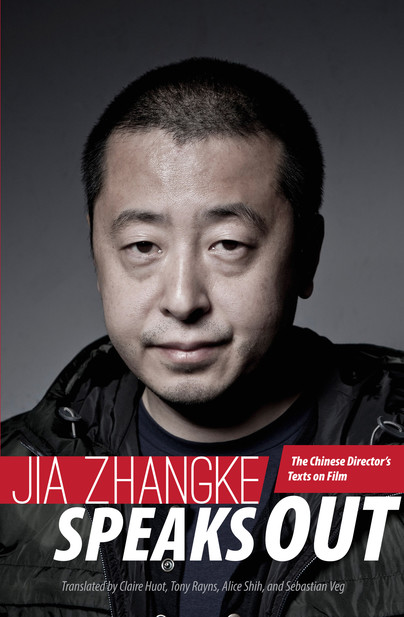
Format: Paperback
Pages: 225
ISBN: 9781626430280
Pub Date: 30 Oct 2015
Description:
Jia Zhangke Speaks Out is a collection of writings by China's most acclaimed film director, Jia Zhangke. The book, originally published in 2009 by Peking University Press, contains Jia's selections of his own writings on film. While he has given numerous film-specific interviews throughout the years, his own notes on cinema, on his own production, and on Chinese culture are unknown to non-Chinese readers.
This collection gives access to the key scenes of his life, films, and meetings with other filmmakers, from Hou Hsiao-hsien to Martin Scorsese. From his point of view, we get an insightful and profoundly original take on China's film history, its ruptures and failings, as well as on the post-Tiananmen filmmaking industry, with its blockbusters on one side and indie films (like his) on the other.


















